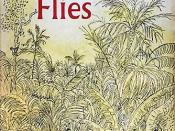How does Golding make this a powerful and significant point in the novel?
Lord of the Flies is an allegorical novel written by William Golding and published in 1954. The end of Chapter Two is a particularly powerful moment in the novel as the characters true characteristics are beginning to be known, as well as showing that a semblance of civility is still a part of the boys' community.
Even in the early stages of the novel, Golding manages to convey the significance of civilisation and the powerful affect they will have on the story if rules are not kept. As Piggy 'indignantly' defends himself against the onslaught of criticisms from his fellow 'boys', Golding emphasises the power that a misuse of delegation cause. This is a turning point for Piggy as he begins to fight back against the stigmas held against him for being 'fat' and wearing glasses. The significance of his tone is demonstrated as Ralph then 'licked his pale lips', showing defeat.
Indeed, Ralph is the supposed leader of the 'kids', yet he shows anguish at the slightest challenge.
Furthermore, the introduction of savagery is particularly powerful in this passage as the reader begins to see the true nature of the island and the boys. Golding emphasises the significant nature of Jack as he 'turned' on Piggy. The powerful use of this action verb forebodes the forming of the 'tribe' later on in the novel, as when the rules are gradually forgotten science is pushed aside as the basic need to survive takes over. The 'turning' of Jack represents human nature at its most basic, which makes it extremely powerful since the reader can see the turning point and the primal instinct of survival begin to root itself in Jack. His silence is as powerful as Piggy's...


